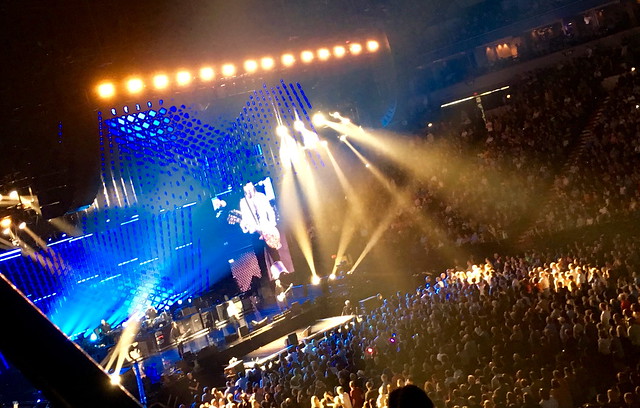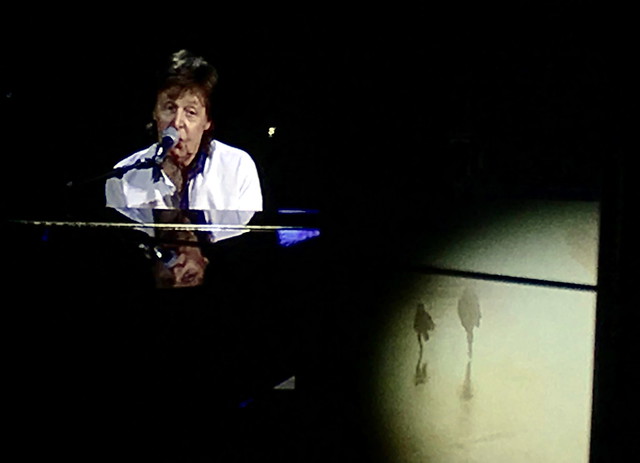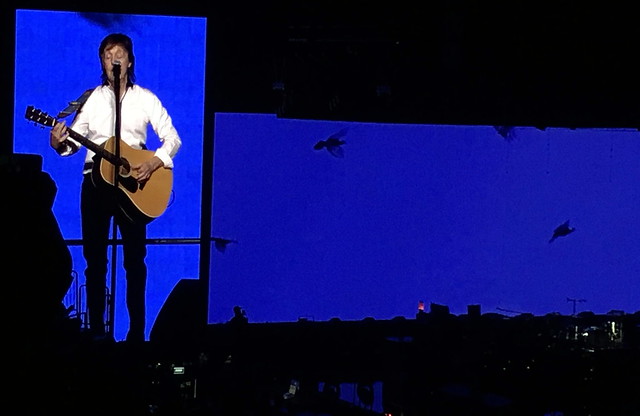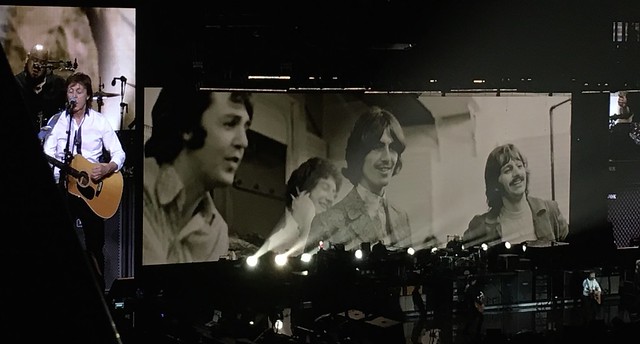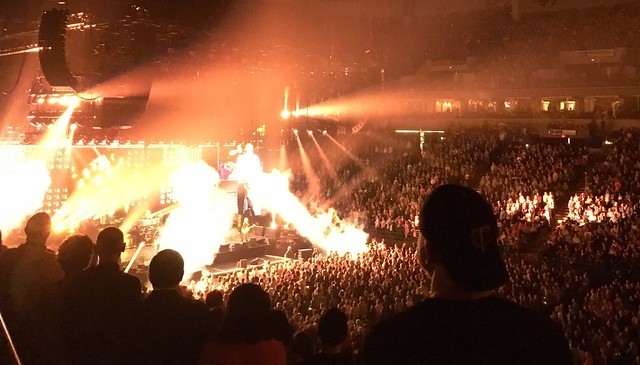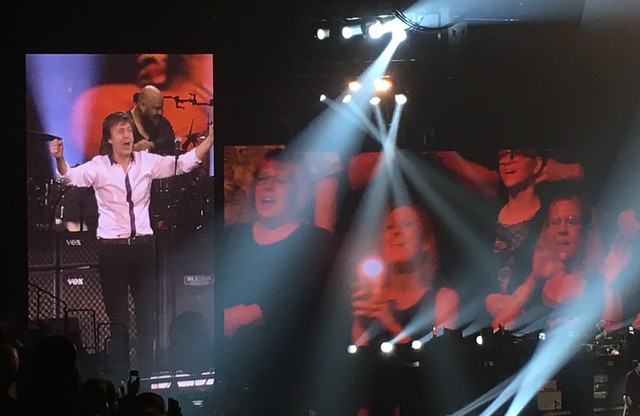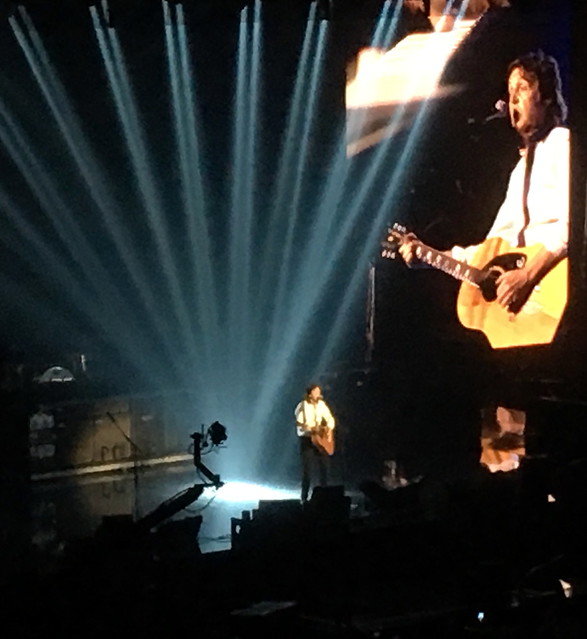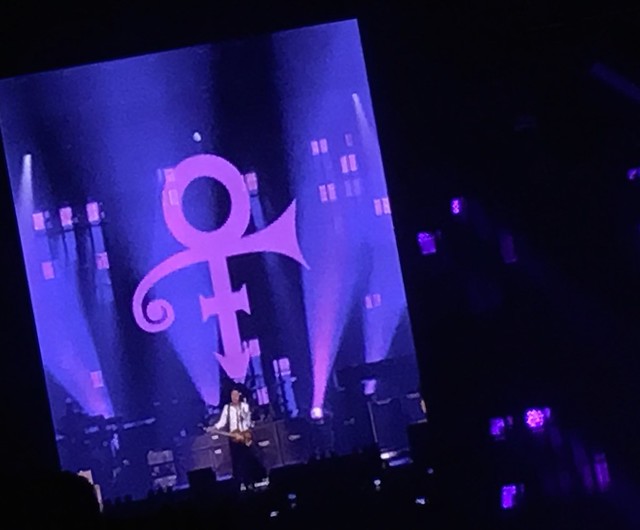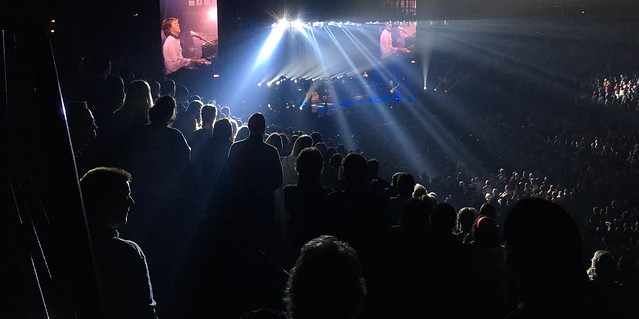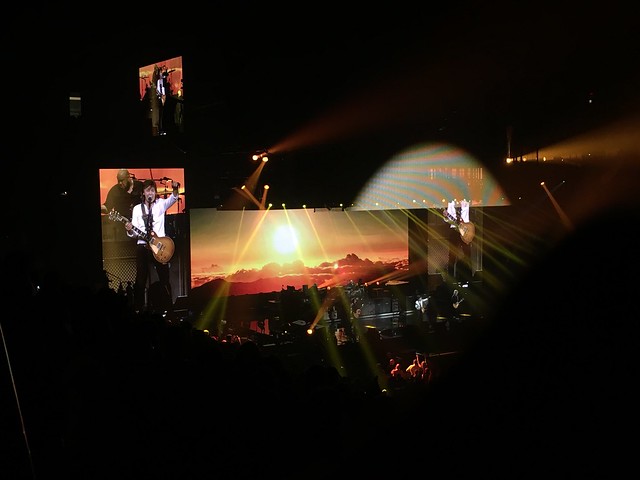We often speak of the popular music of given eras as providing soundtracks for different generations. Each of us has that particular set of songs or musical artists who define the music of our adolescence. Sitting in Target Center in Minneapolis on May 4 I realized that, even for my cohort, the oldest group of Baby Boomers, that line is too limiting for Paul McCartney and the Beatles. They have provided, together and separately, a soundtrack for at least half a century.
Over the years a number of friends and acquaintances have been to McCartney concerts and reported that it was one of the most amazing concert experiences of their lives. When tickets for the Target Center concert popped up on my Facebook feed the last week of April, I jumped at them. The dream of my lifetime was to see the Beatles in concert. They stopped touring as the Beatles 50 years ago this summer. But here was Sir Paul. Why not?
Personally I was a little worried before the concert started. As the 8:00 starting time approached there were still about 20% of the seats empty. Has Paul lost his following? Are people leaving the Beatles behind. By the time the concert began, though, almost every seat was filled.My guess is that the security lines were too long.
In any case we waited. It was 45 minutes more of what I can only call the worst music experience in a live music setting.
No it wasn't an opening group. It was a techno-beat soundtrack mix of Beatles/McCartney music. It was too loud and far too techno. For a total of over 75 minutes I felt I was being pounded into submission by a relentless beat. (I have never taken the drug Ecstasy, but I think I understand why clubbers do.) I was actually worried that by the time McCartney took the stage I would be so beaten down that I wouldn't enjoy the show.
Yeah, right.
Not a chance.
Here are ten of my pictures from the concert along with some more thoughts. A link to my complete album on Flickr is at the bottom along with a link to the setlist online.
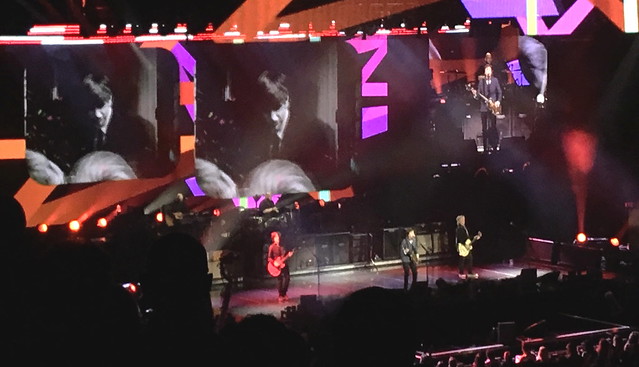
The first seven songs of the set:
A Hard Day's Night
Save Us
Can't Buy Me Love
Letting Go
Temporary Secretary (A real dud in my book. The only one.)
(A Foxy Lady snippet)
I've Got a Feeling
My Valentine (for his current wife, Nancy)
From
City Pages review:
If death hung heavy in the air — and constant reminders of John Lennon, George Harrison, Linda McCartney, producer George Martin, and Prince made sure that it did — the mood was still celebratory. We're witnessing pages of rock history come to life, after all, and the knighted, mythic creature performing the songs still seems to believe in their power. The packed crowd of around 19,000 did, too.
Paul mentioned the late great Jimi Hendrix after the Foxy Lady riff and then said he was dedicating the concert to our own late, great Prince. He told of seeing Prince perform at a small cafe this past New Year's Eve. "We saw the new year in together and that was beautiful — God bless you Prince!"
Prince. Minneapolis.
Minneapolis. Prince.
It goes together.
Nineteen Hundred and Eighty-Five
Here, There and Everywhere
Maybe I'm Amazed (for his late wife, Linda.)
We Can Work It Out
In Spite of All the Danger (The Quarrymen song)
You Won't See Me
Love Me Do (Dedicated to George Martin who died in March)
And I Love Her
Blackbird
The Quarrymen song went back to 1959 when it was Paul, John, and George and "two other guys" that he told us we wouldn't know. He said their nicknames, and everyone laughed. We didn't know them. It was a country-style, skiffle/rock-a-billy song. He even tried to wiggle and jiggle like Elvis. Applause and laughter!
He told a story of George Martin, the Beatles' superlative producer asking Paul to do the singing on "Love Me Do" so John could play the harmonica. Without George Martin, he said, there wouldn't have been the Beatles.
Then there was "Blackbird." He mentioned that they wrote it in solidarity with the people in Little Rock, Arkansas, who were standing up for civil rights. It was a beautiful rendition with appropriate video accompanying him.While singing he was lifted on a hydraulic stage section. A little over done.
Here Today
Queenie Eye
New Song
The Fool on the Hill
Lady Madonna
FourFiveSeconds
(Rihanna and Kanye West and Paul McCartney cover)
Eleanor Rigby
Being for the Benefit of Mr. Kite!
Something
He started "Here Today" by saying it was written to John Lennon. Sadly, he said, it was "a conversation we never had." He urged the audience to say what they needed to say to the people they cared about while they had the chance.
He started "Something," a George Harrison song, by playing it on the ukulele which he said was how George first played it for him. It continued into a guitar slashing of highest quality!
Ob-La-Di, Ob-La-Da
Band on the Run
Back in the U.S.S.R.
Let It Be
Live and Let Die
To quote the City Pages reviewer:
Paul performing "Let It Be" at the piano is all any music fan could really ask for.
With "U.S.S.R." he told an anecdote about being in Russia and having Russian officials tell him about listening to the Beatles' music. It was one of a number of times that Paul truly made it a personal evening, befitting the tour's title, One on One
"Live and Let Die," the heavy-duty title rocker from the James Bond film, gave us all a start when the pyrotechnics started. Sure, it was over-the-top, but it fit!
Hey Jude
Even as a sing-along, this one still moves across the ages. Take a sad song, and make it better.
Encores:
Yesterday
In many ways the most moving moment of the show for this old Beatles' fan was the opening encore number- Paul's acoustic rendition of "Yesterday." It kept its power with the strings being added through the miracle of electronic keyboard. As Wikipedia reminds us, "Yesterday":
remains popular today with more than 2,200 cover versions and is one of the most covered songs in the history of recorded music. "Yesterday" was voted the best song of the 20th century in a 1999 BBC Radio 2 poll of music experts and listeners and was also voted the No. 1 pop song of all time by MTV and Rolling Stone magazine the following year.
The song was released as my senior year in high school began in September 1965. Hearing Paul sing it in May 2016 was nothing short of a spiritual connection across this half-century. The lighting, as I looked at it, started at that small moment in time, the spot on the stage, in 1965 and spread out into today. I know the lights were pointing down, but the meaning of the lights seemed to me a metaphor for the song itself, rising from that spot into its place in popular music history.
Hi, Hi, Hi
Let's Go Crazy (Prince cover)
He followed that short cover with a statement in honor of Prince.
He's your guy.
Birthday
Golden Slumbers
Carry That Weight
The End
And in the end, the love you take
is equal to the love you make.
Okay- I was prepared to be disappointed. The techno-crap before the concert did not do justice to the evening. I tried to keep my expectations as low as possible even though in my mind I kept saying, "I'm going to see one of the Beatles. My God, really! The Beatles!" I never expected to see any of them in live concert. After seeing my personal idol Herb Alpert last fall I knew that the older group of my generation's music can still do their thing. Alpert was 80 at the time. McCartney turns 74 next month. John and George are gone. But a 73-year old McCartney? Does he still have it?
Well, expectations are meant to be lived up to more often than they are broken. The initial reality of seeing Paul there, in person, playing those songs gave way to the joy and celebration of these past 50 years of his music- my music- our music. He looked older and had a sense of maintaining his energy while letting it out as appropriate for what he does today. He sounded like he had a cold and had some difficulty making the full range of the older vocals. But, as the accomplished performer he is, he made that part of the awe of the show.
He can still do it. He can still make these songs real and alive. There were, at times, even signs of the old Beatles' smart-alack attitude as he yelled back and forth with fans in the audience or gave the audience that old, much younger, Paul McCartney grin. I am grateful, by the way, for the large projection screens that allowed everyone to see and react to him, in person, almost one on one. The Beatles started the use of patterns and psychedelic images in some of their videos, so that felt like a good way to add to the overall ambience of the show.
The show itself was about two hours and forty-five minutes- with no breaks! He started and never stopped. He played three dozen songs. Acoustic. Classic Rock. Beatles songs. The audience was with him from the word "Go!" While tending to be a lot of Boomers, the crowd covered at least three generations. Sir Paul himself predates the Boomers who are starting to turn 70 years old this year.
Seventy!
And right there, on the stage was one of our icons. It didn't make me feel younger- or older, actually. It was more of a celebration of our 50+ years together with the music. It reminded us of the innocence of our youth and young adulthood. It reminded us of the ups and downs of life with loss and death always hanging around. Yet in the end the loss and death do not win.
The music does.
And we are better for it.
Thanks, Paul. It was a joy being with you. One on one, with 19,000 of your closest friends.
Click below for complete album of my pictures.
Paul McCartney Pictures Album
May 4, 2016
Target Center
Setlist


